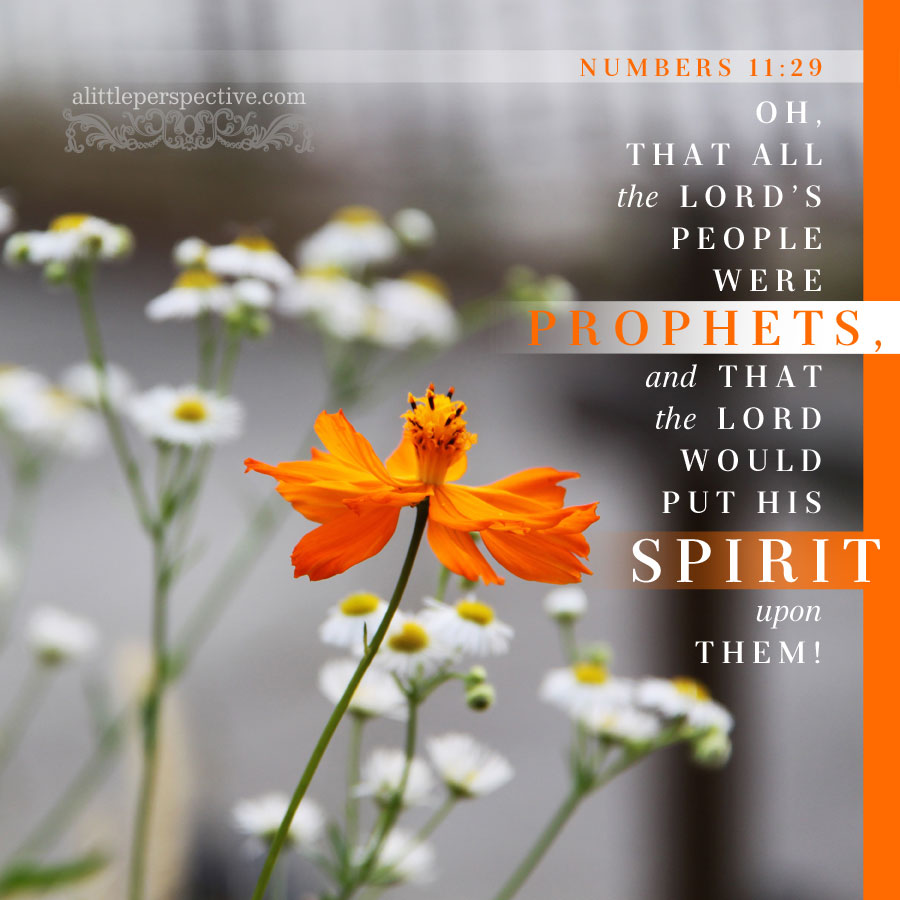Read Numbers 11 and 12 at Bible Gateway.
The Hebrew paragraph divisions for today’s chapters are:
Num 11:1-15 {p} Complaint against the LORD – intense craving for meat
Num 11:16-22 {p} The LORD will give them meat for 30 days until they are sick of it
Num 11:23-35 {p} The 70 elders commissioned + quail + graves of craving
Num 12:1-3 {s} Complaint of Miriam + Aaron against Moses
Num 12:4-13 {p} Miriam becomes leprous
Num 12:14-16 {p} Miriam shut out of the camp 7 days, then received again
Today’s reading forms a chiastic structure:
1a) Num 11:1-3, It displeased YHVH when the people complained;
1b) Num 11:4-15, The people yielded to an intense craving for meat;
1c) Num 11:16-17, Choose 70 elders of the people upon whom I may put My Spirit;
1d) Num 11:18, YHVH will give Israel meat and they shall eat;
1e) Num 11:19-20a, Israel shall eat meat for a whole month;
central axis) Num 11:20b, Israel has despised YHVH who is among them;
2e) Num 11:21-22, Where can meat come from to provide for Israel for a whole month?
2d) Num 11:23, Israel shall see whether YHVH’s Word will happen to them or not;
2c) Num 11:24-30, 70 elders of Israel receive the Spirit of YHVH and prophesy;
2b) Num 11:31-35, YHVH provided quail;
2a) Num 12:1-16, it displeased YHVH when Miriam + Aaron complained.
The tale of two complaints! Actually, three: we are not told what the complaint was of the people in the first verse of Num 11, just that fire of the LORD burned among them because of it.
But is it wrong to want to eat meat? No, I don’t believe that is not why some of them died when the meat was still between their teeth. First of all, it was the mixed multitude among them where the intense craving began (Num 11:4). There were others, not biologically descended from Israel, who went up with Israel out of Egypt after the death of the firstborn (Exo 12:38). By the 7th plague, the plague of hail, there were those even in Egypt, who had learned to fear the word of the LORD and do what He said (Exo 9:20-21), and we assume this is where the mixed multitude came from – those not biologically of Israel, who had learned to fear the word of the LORD and joined themselves to Israel.
Now ever since the command of the Passover was given in Exo 12, God has said multiple times that there shall be one law and the same commandment for the native born and for those who are strangers among them (Exo 12:49), and we assume it is for the sake of the mixed multitude with them (and those who would join themselves to Israel in the future because of the God of Israel as the mixed multitude had done) that the LORD keeps repeating this instruction.
So the craving spread to the children of Israel also, and they cried for the meat and food of Egypt. They were eating bread from heaven, that the Scripture says tasted like pastry (Num 11:8), however, Israel was tired of it!
The second complaint was about Moses’ Ethiopian wife. Josephus records that while Moses was still a prince of Egypt, he led Pharaoh’s army south to Ethiopia, which was tributary to Egypt, and quelled an uprising there. He covered himself with honor on this occasion and received the Ethiopian princess for his wife as a part of the peace settlement. I assume that when he fled Egypt, he must have thought he would never see his wife again, as his life as a prince of Egypt was now a closed chapter, and he started a new life with the daughter of the high priest of Midian. Now for the first time Scripture makes mention of his Ethiopian wife, so we assume that when he returned to Egypt, sometime before the death of the firstborn, she also learned to fear the word of the LORD and was reunited with her husband. This is all speculation, but this is how I imagine the few details we have from non- biblical history fits into the Scriptural narrative.
When Israel’s complaint was against the LORD, as with the meat, Moses went before the LORD and sought Him about it. When it was just Miriam and Aaron’s complaint against Moses, Moses did not say a word to the LORD about it (that Scripture records). The LORD Himself took up Moses’ defense as Moses (rightly) did not defend himself. This is an instance of the same character trait of yielding rights that was displayed by the patriarchs in Genesis.
But the complaint of Israel is coupled with the complaint of Miriam and Aaron in the chiastic structure, because Scripture wants us to see that just as manna was a good gift from the good LORD to His people, so Moses was a good gift from the good LORD to His people. And when we complain to Him about His good gifts, we are really accusing Him of not being good, or of not being able to provide for us or take care of us. That the LORD’s people would guard themselves from complaints, which all ultimately, are an accusation against Himl!

















New insight for me as to Moses wives and complaints about appointed leaders…. reflection of inadequacy of God himself
in these times! Easter all the more brings confidence to me that his word is the only surety in all heaven and earth …
Bless your family may memories and love fill your heart … Shalom